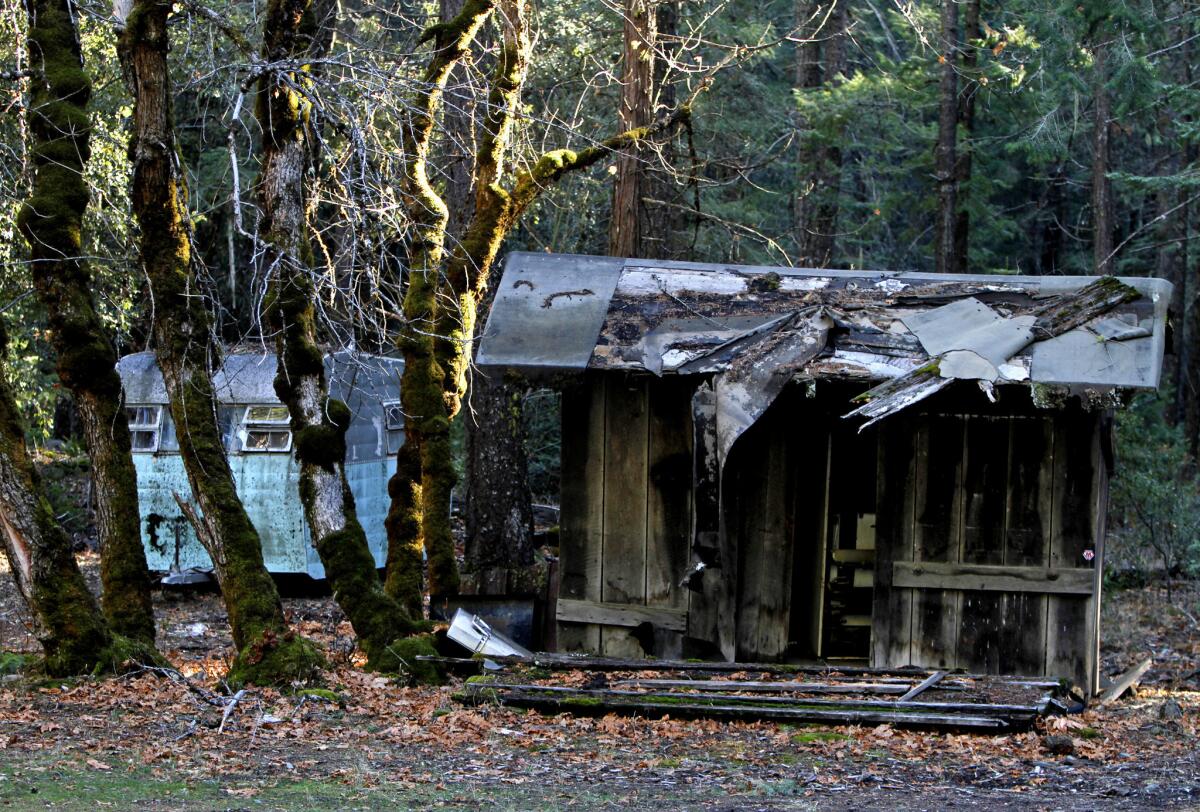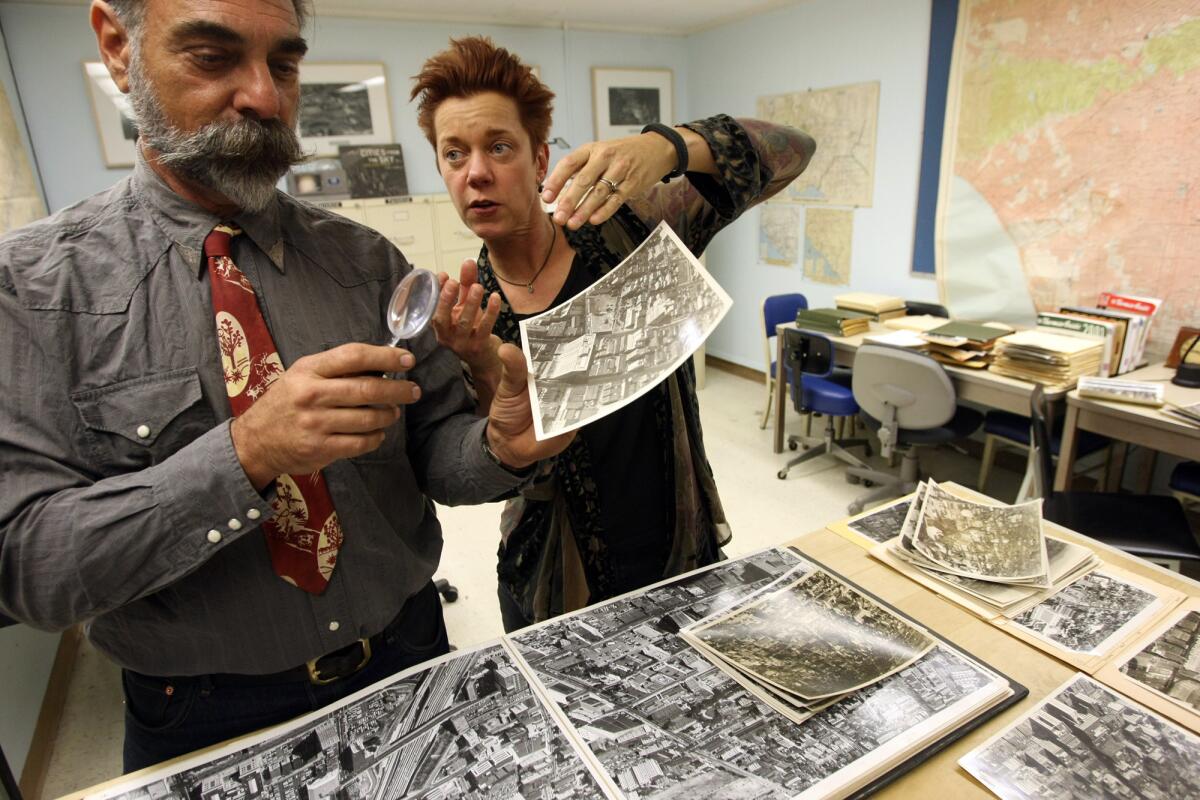A healthcare navigator in unfriendly waters
Quinetta Rascoe is working to sign people up for coverage under Obamacare in rural North Carolina, where lawmakers are hostile and many of the neediest people are skeptical and uninformed.
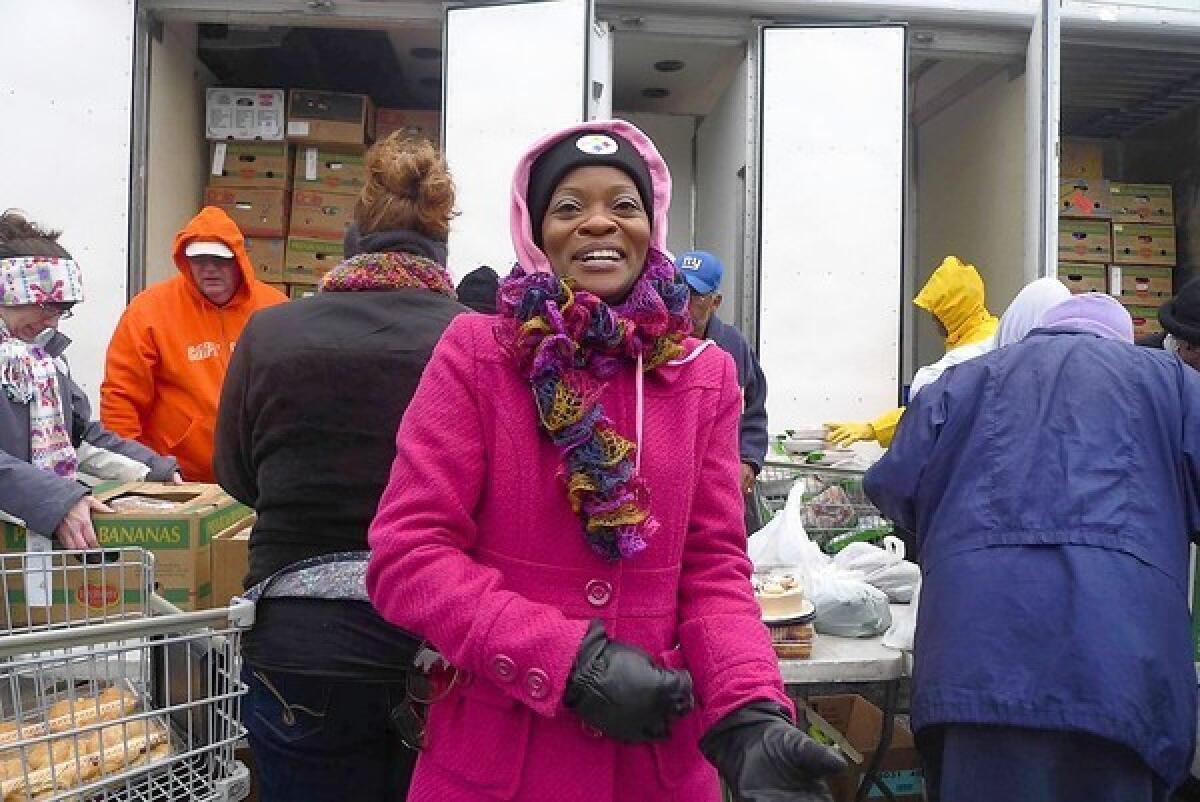
Snow came early to the cotton and sorghum fields here, sending dozens of cash-strapped families to the food bank on a recent afternoon for frozen chickens, cucumbers and canned green beans.
Quinetta Rascoe was waiting for them.
Wearing a bright pink overcoat, a glittery rainbow scarf and an infectious grin, Rascoe climbed out of a Toyota sedan carrying a stack of Obamacare brochures.
She eyed about 60 cars that were snaking into the parking lot behind Murfreesboro Baptist Church, prompting an unusual traffic jam one block off the town's dozy Main Street.
The food truck was late, and white plumes floated up from mufflers as the drivers switched their engines on and off and on again to warm themselves with blasts of heat.
"OK," Rascoe said, grabbing a pile of freshly printed business cards. "Let's go talk to people."
Rascoe is one of thousands of foot soldiers hired nationwide to sign Americans up for coverage under President Obama's Affordable Care Act.
Her task is made all the more challenging because she works in one of the Republican-led states openly hostile to the act. The GOP-controlled Legislature ordered state health officials not to cooperate with the federal program.
Many of the people in this rural swath of North Carolina â despite being among the neediest potential beneficiaries of Obamacare â remain skeptical and uninformed.
Walking up to the first vehicle, Rascoe smiled, shuffled on the balls of her feet and wiggled her fingers to get the perplexed driver of a dinged blue pickup to roll down the window. She explained she was there to answer questions about the Affordable Care Act.
The man mumbled a greeting, took the flier and quickly rolled up the window.
"Next car!" Rascoe said.
She felt lucky if she could persuade a driver to crack open the car window to take her card and a brochure. Some ignored her, a few listened politely.
"I just smile and give them the information; sometimes a light bulb goes off later and they call," Rascoe said.
One woman in a Chevy Bronco said she'd heard on the news that the website was down and no one could get enrolled. "Turn off the TV!" Rascoe chided. "Come down, and I'll help you out." The woman said she'd think about making an appointment.

The website of the U.S. government health insurance exchange, healthcare.gov. (Karen Bleier / AFP/Getty Images)
Rascoe, 37, works most days in a small office at the Roanoke Chowan Community Health Center in nearby Ahoskie. The mouse for her desktop computer rests on a yellow foam pad stamped in red with the outline of a Trojan, the mascot for the University of Southern California, where she is taking online courses toward a master's degree in social work. A USC banner pinned to the wall reads: "Fight on."
When a person walks into her office, Rascoe asks questions to suss out whether the customer qualifies for the healthcare exchanges or for other federal programs like Medicare or Medicaid. She also tells the customer about a program at the health clinic that offers discounted rates based on a patient's income level.
At the moment, Rascoe's the only person at the clinic who is dedicated full time to signing people up for medical coverage. Local organizations across the state received a total of $7 million in federal grants to train and hire 300 Obamacare counselors.
But beyond a two-day online training course, a stack of government-issued brochures, business cards and a cellphone provided by the health center, Rascoe is largely on her own to come up with ways to find the uninsured.
It's a stark difference from other states that are trying to bolster enrollment by launching their own websites and ad campaigns and enlisting state employees to help people find insurance.
Instead, North Carolina rejected $23 million in federal money that could have been used to educate and assist more than a million uninsured in the state. It also turned away $4 billion in federal funds to expand the Medicaid program for the poor.
I don't feel that the law was designed for people to go sign up on a whim. It takes education."â Quinetta Rascoe
Lack of awareness and bad press in North Carolina have made Rascoe's attempts to enroll people more difficult. "I don't feel that the law was designed for people to go sign up on a whim," she said. "It takes education."
During October, the month the healthcare exchanges opened, about 1,600 people in North Carolina signed up for coverage â only 12% of the number officials expected, according to federal figures.
None of those were Rascoe's clients. Since then, she has completed the enrollment process with four applicants.
Like millions of other Americans, Rascoe has been hindered by the malfunctioning federal website, which makes it arduous to get information about potential premium subsidies or plan options. Instead, she relies heavily on the toll-free hotline and regular mail.
One of her biggest challenges is simply tracking down potential enrollees. Because the rural, impoverished county doesn't have a YMCA or a community center where families congregate, she hits churches, colleges and food banks like the one in Murfreesboro. She persuaded the electric company to include more than 9,000 fliers on Obamacare with December's electricity bills.
She has given out her number at grocery stores and introduced herself at hair salons. She plans to set up an information table at the Wal-Mart Supercenter in Ahoskie.
Handing out bread and boxes of Cheez-Its at the food bank, Rascoe made eye contact with a lot of the families she had been soliciting in line. "You better come see me," she said into the window of a car before it drove away.
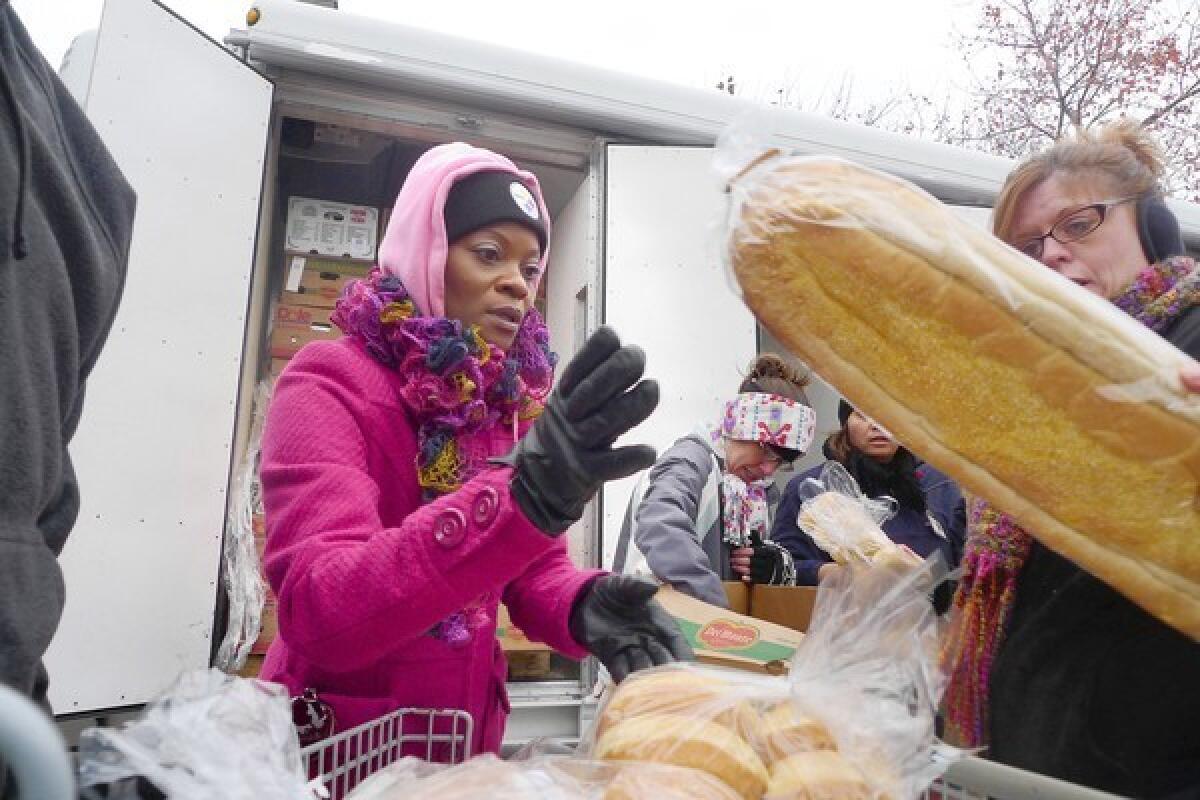
Healthcare navigator Quinetta Rascoe helps distribute food, along with business cards and information on the Affordable Care Act, to needy families in Murfreesboro, N.C. (Brian Bennett / Los Angeles Times)
Though the work can be frustrating, Rascoe said, it still beats her last job as a debt collector. After spending six years telephoning the poorest families in the county to coax them into paying outstanding bills, she finds it more rewarding to help many of those same people find insurance that could save them hundreds, if not thousands, of dollars a year.
Half of the families around here earn less than $31,000 a year, making Hertford one of the state's poorest counties. It's a region where during harvest time, the highway shoulders are dusted with white cotton bolls blown off tractors, and where, if residents aren't farming the land, they're working at the nearby steel mill, poultry plant or federal prison.
The small towns around here were built more than 200 years ago in the boom days of cotton and tobacco and never got much bigger. Even fellow North Carolinians know the area mostly as a web of two-lane highways leading to the beaches of the Outer Banks.
Rascoe's grandfather was one of 10 children born on a small piece of land his family owned and farmed in Ahoskie. He fled Hertford County in the 1940s to find a job as a sanitation worker and started a family in New York City, where Rascoe was born to his only son.
Rascoe's family later moved to Pittsburgh so her brother, who had Kawasaki syndrome, could visit specialists at Children's Hospital of Pittsburgh, known for its treatment of the rare vascular disorder. She saw the expensive medical care strain her family's finances.
"This is personal for me," Rascoe said.
On cold days, she still wears a black wool headband embroidered with the Pittsburgh Steelers diamond logo.
Several years ago, Rascoe relocated to the family homestead and moved into the small three-bedroom house with blue aluminum siding her grandfather grew up in. Her roots in the area help Rascoe identify with the locals' concerns.
They'll be back. I don't rush anybody."â Quinetta Rascoe
"They are scared," she said. She tries to dispel myths about the law: No, the government can't access your bank account, Rascoe tells people. Yes, it is possible to sign up even though the website is slow. Some are put off by how much personal financial information they need to provide in order to register.
She had three people walk out when the website asked them to confirm details pulled from their credit history, such as a car lease, a previous address or a former employer. The questions pop up to prevent fraud.
"They'll be back," Rascoe said. "I don't rush anybody."
Other times it's simply a matter of introducing people to basic technology that most Americans take for granted. After she helped one client set up an email account, the woman immediately dialed a family member to announce: "Grandma's got an email address!"
Constance Boyce, 63, a hairdresser who makes about $14,000 a year, came into Rascoe's office on a recent morning to find out whether she qualifies for federal subsidies. Boyce had canceled her private medical insurance earlier this year when she visited a doctor about a pain in her arm and learned she needed to pay a $10,000 deductible before the plan would cover any costs.
Boyce, who wore a tweed suit for the appointment, sat next to Rascoe and watched HealthCare.gov load on the screen. But Boyce couldn't get past the first step of the website because she forgot the password for her email, which she needed to set up and verify a new account.
Rascoe then dialed the federal hotline and handed Boyce the receiver. During the call, Boyce looked to Rascoe to explain some of the jargon used to describe insurance policies, like "co-pay" and "deductible." The pair set up Boyce's insurance account over the phone, but she'll have to wait for the government to send her plan options in the mail.
Nevertheless, Boyce was confident she'd qualify for a subsidy. She left satisfied.
"I'm quite elated," she said.
And Rascoe earned the kind of endorsement that can go a long way in Hertford. Back at Boyce's salon in the nearby town of Winton, a stack of Rascoe's business cards won a coveted spot on the counter, next to those for Boyce's favorite mechanic and orthopedic surgeon.
Follow Brian Bennett (@ByBrianBennett) on Twitter
Follow @latgreatreads on Twitter
More great reads
Tiny museum in New York showcases the ordinary
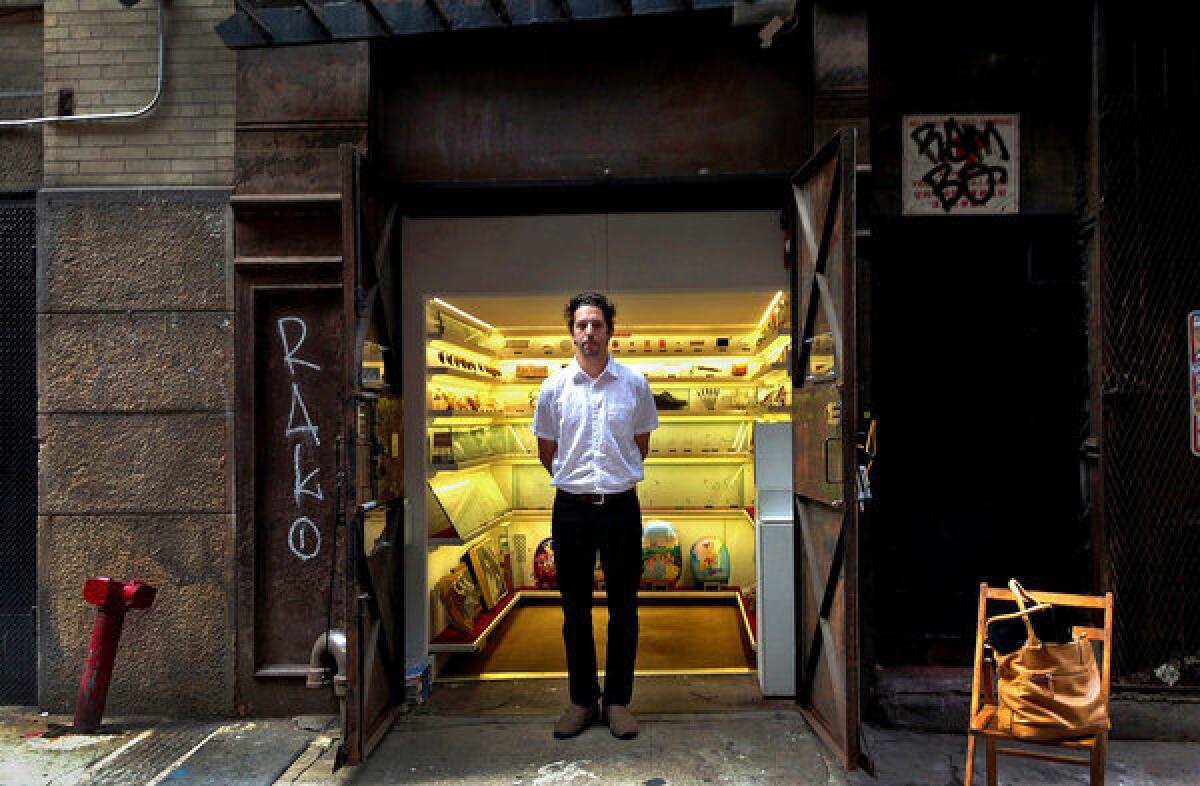
Sign up for Essential California
The most important California stories and recommendations in your inbox every morning.
You may occasionally receive promotional content from the Los Angeles Times.
